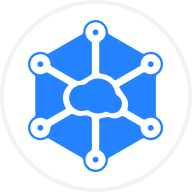Internet Computer Protocol is an innovative, decentralized blockchain network that aims to make blockchain technology accessible to the general public. It seeks to expand the capabilities of smart contracts and turn the public internet into a global cloud computing platform.
One of the most common criticisms leveled at blockchain technology is that it needs to be faster and more convenient to gain widespread adoption. Internet Computer Protocol aims to address this by making blockchain functionality available at web speed. Simultaneously, it ensures transaction finality in less than one second and micro gas fees. It also provides a seamless developer environment for deploying smart contract code directly onto the public internet. This simplifies the experience for both application developers and users.
Internet Computer Protocol network's architecture is intended to give independent data centers the flexibility to communicate and to provide a fully decentralized cloud computing platform. One of Internet Computer Protocol team's primary goals is to reduce society's reliance on centralized alternatives such as Amazon Web Service and Google Cloud Servers.
ICP is the native token of the Internet Computer Protocol ecosystem, and it is required to vote on governance issues that shape the project's direction. ICP can also be staked to earn ongoing crypto rewards. Staking ICP reduces sell pressure and helps to support the price of the token.
How does Internet Computer Protocol work
The central idea behind the Internet Computer network is to create a unique, decentralized internet and a worldwide cloud computing system powered by interlinked, independent data centers to rival centralized cloud providers such as Amazon Web Services, Google Cloud, and Microsoft Azure.
Many consider the current internet a problem because it is centralized, and popular applications are close-sourced and keep their technology private. With much of the internet's storage needs being met by a few large, centralized providers, if a major data center fails, many businesses and users might be unable to use the services. Another major disadvantage of centralized cloud storage is that centralized providers have the power to censor or shut down applications they host at will.
Internet Computer Protocol wants to change all of that. The Internet Computer is an attempt to create an alternative version of the internet that allows developers to use decentralized services to host their applications without fear of censorship, de-platforming, or loss of user data. This is aimed at further incentivizing open-source and transparent software development across the globe.
Any interested individual or data center with the requisite storage capacity and wishes to join the network as a storage node operator is free to do so. They are paid for the storage they provide and further rewarded with token rewards.
Chain key technology
One of the fundamental new implementations in the Internet Computer Protocol chain is its reimagined chain key technology. The Internet Computer Protocol network utilizes a single public key, allowing the chain to rapidly deploy millions of nodes. With its unique chain key technology, any device, such as a mobile phone or tablet, can confirm the authenticity of on-chain events.
Reverse gas model
While most chains require users to pay gas fees in order to complete transactions, Internet Computer Protocol employs a novel reverse gas model. Developers pay to run decentralized applications (dApps) on the Internet Computer using this mechanism. As a result, non-technologists can interact with blockchain technology without the need for specific tokens. This makes the technology much more accessible and lowers entry barriers for users.
The Motoko smart contract language
DFINITY developed Motoko, a new programming language for smart contracts. It makes it simpler to use the unique features of blockchain and can easily accommodate Internet Computer Protocol's ideology for a fully decentralized blockchain protocol. Automatic memory management, generics, type inference, pattern matching, and arbitrary- and fixed-precision arithmetic are examples of Motoko's productivity and safety features.
ICP price and tokenomics
ICP has a total supply of about 488 million, giving it a fully-diluted market cap of almost $4 billion. ICP tokens are created and given out as a reward to participants who vote on proposals and manage storage nodes. The Internet Computer Protocol also utilizes another token known as "Cycles," which are converted from ICP tokens and used to support computation.
Internet Computer Protocol conducted several funding rounds over several years to build initial early support for the project. According to Messari, the first funding round was completed in Febuary 2017, and successfully raised over $4 million for the development of the network. Subsequent token sales in February and August 2018 raised over $117 million.
Early investors were able to buy ICP tokens for as little as $0.035 per token in the funding rounds. Speculators believe that this is the reason for the strong selling pressure visible in ICP charts and Internet Computer Protocol's price decline when the token launched public trading at $365 per ICP.
The initial distribution of ICP tokens were allocated almost entirely to the Internet Computer Protocol team and early investors. ICP tokens were allocated in the following manner:
- Seed: 24.72 percent
- DFINITY Foundation: 23.86 percent
- Internet Computer Protocol Team Members: 18.00 percent
- Early Contributors: 9.50 percent
- Strategic Sale Buyers: 7.00 percent
- Presale Buyers: 4.96 percent
- Internet Computer Protocol Association: 4.26 percent
- Partnerships: 3.79 percent
- Advisors and Investors in relevant third-party tokens: 2.40 percent
- Airdrop for ICP Community: 0.80 percent
- Developer and Community Grants: 0.48 percent
- Operators of Network Nodes: 0.22 percent
About the founders
Internet Computer Protocol network was founded and developed by the DFINITY Foundation, a not-for-profit research foundation focused on scientific pursuits. The DFINITY Foundation was originally founded by Dominic Williams, who fills the founder and Chief Scientist role. Williams is a recognized and celebrated crypto theoretician credited with inventing innovative crypto concepts such as threshold relay and probabilistic slot consensus.
Before founding the DFINITY Foundation and launching Internet Computer Protocol, Williams was the President and Chief Technology Officer at String Labs, a launchpad for new crypto startups. He also had great success developing online games for children that supported millions of users.
The DFINITY Foundation is based in Zurich, Switzerland. It is made up of world leaders in cryptography, programming, and distributed systems. Alongside Williams, the DFINITY Foundation benefits from the expertise of some of the industry's most celebrated technologists, including:
- Jan Camenisch: Cryptographer and privacy researcher who previously led IBM's cryptography and research department during a 19-year tenure
- Andreas Rossberg: Co-creator of WebAssembly
- Ben Lynn: Cryptographer and Google engineer
- Jens Groth: Cryptographer, most notably famous for developing some of the first non-interactive zero-knowledge proofs
- Timo Hanke: An algorithmic Bitcoin mining optimizer
- Paul Liu: A PhD holder and engineer who designed the Haskell compiler used by Intel
- Johan Georg Granström: Previously employed as a senior software engineer at Google, Granström also designed YouTube's scaling infrastructure
Internet Computer Protocol has secured close to $167 million in funding from 15 investors, including Andreessen Horowitz, 9Yards Capital, Polychain, Aspect Ventures, and Village Global.
DFINITY has had three funding rounds. Their most recent investment came from a venture round on August 28, 2018, in which they raised $102 million. Also, DFINITY invested $25k in SPEEQO on January 20, 2022, a voice-based machine learning software company.
What makes Internet Computer Protocol unique
Internet Computer Protocol boasts a wide variety of unique features that separate it from other popular blockchains. For example, Internet Computer Protocol is the only network, apart from Bitcoin, that is operated by zero centralized cloud computation nodes. In contrast, roughly 70 percent of Ethereum nodes and 50 percent of Solana nodes are actually hosted by cloud servers provided by centralized bodies like Amazon Web Services and Google Cloud Service.
The Internet Computer Protocol aims to provide the general public with a more user-friendly experience. As a result, it is the only public blockchain in which smart contracts are run and HTTP calls are directly served to browsers. In other words, inexperienced users will unknowingly interact with Web3 technology and blockchain functionality.
Internet Computer Protocol highlights
ICP/BTC integration beta API
On August 4, 2022, DFINITY announced the beta release of ICP's Bitcoin testnet Application Programming Interface (API), which enables direct interaction with the Bitcoin network and eliminates the need for a middleman or bridge. With the integration's APIs, developers can start developing and testing immediately.
ORIGYN NFT marketplace
The ORIGYN Foundation, a Swiss company that identifies, authenticates, and unlocks the potential of NFT for luxury objects, fine art, media, and collectibles, was one of the first to begin building on the Internet Computer Protocol. ORIGYN issued a native utility token, OGY, prior to the impending launch of Impossible Things, an ORIGYN-powered marketplace for trading NFTs backed by verified assets, marking a significant development for the ICP ecosystem.




































